Kingdom of France

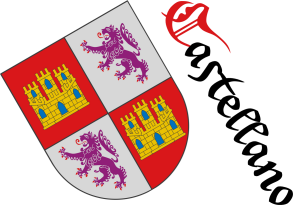
Amancier, lineage of Genevois
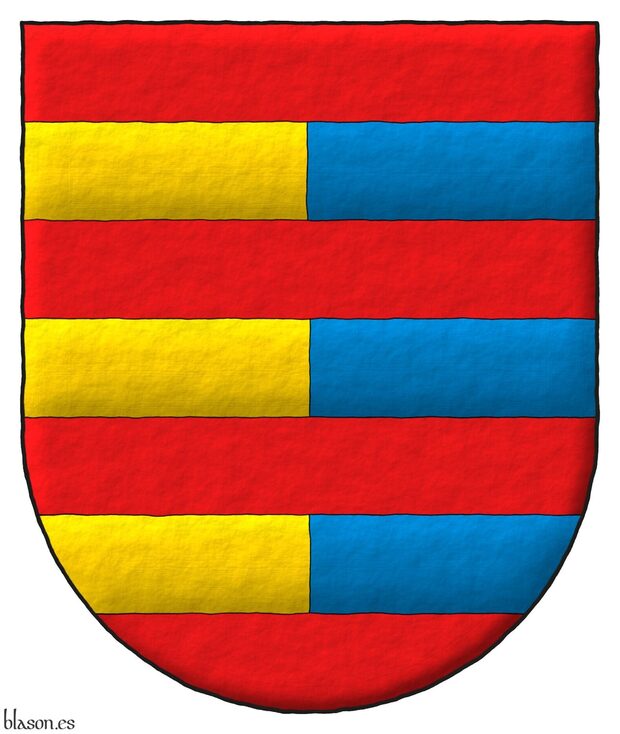
Blazon of the Amancier lineage of Genevois, Haute-Savoie, France.
Gules, three bars per pale Or and Azure.
Illuminated and a freehand finishing.
Its French blazon «de gueules, à trois fasces parties d'or et d'azur» can be found at [Rietstap, J. B.; 1861; page 40].
Any fess party per pale of metal and color or color and metal will always have a metal on metal or color on color conflict whether the field of the coat of arms is color or metal. There isn't conflict if the field of the coat of arms is also party per pale with metal under the color of the fess and with color under the metal of the fess or if the field is fur.
Blazon keywords: Without divisions, Gules, Three, Fess, Party per pale, Or and Azure.
Style keywords: Freehand, Outlined in sable, Illuminated and Semi-circular.
Classification: Interpreted, Lineage and Kingdom of France.


André, lineage of France
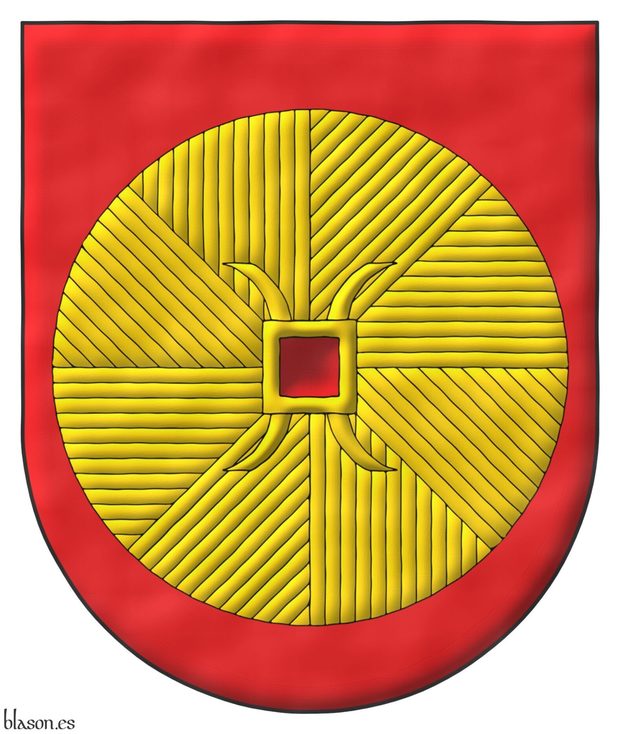
Blazon of the André lineage of France.
Gules, a millstone Or.
Escudo de gules, una piedra de molino de oro.
Illuminated and a watercolor finishing with shadow in the hole.
For its better identification, I have painted the millstone with the ring that fixes it to its axis. This ring is called a millrind, it is made of iron, and usually has 4 arms to better fix the millstone. Millrinds may appear on coats of arms independently of millstones. Another heraldic element related to the previous ones is the millwheel, which is a toothed gear that is part of the mill mechanism but should not be confused with the millstone that grinds the grain.
Blazon keywords: Without divisions, Gules, One, Millstone and Or.
Style keywords: Watercolor, Outlined in sable, Illuminated and Semi-circular.
Classification: Interpreted, Lineage and Kingdom of France.


Bailleul, commune of
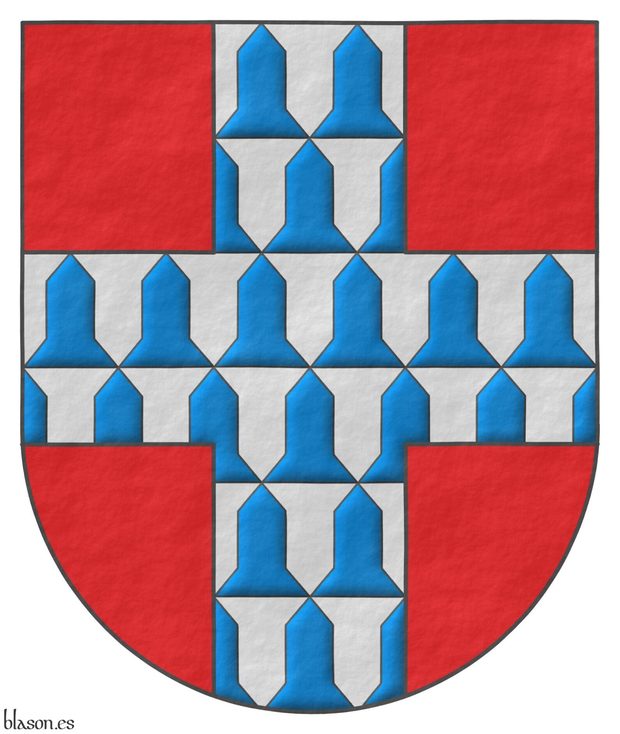
Gules, a cross vair.
Escudo de gules, una cruz de veros.
Coat of arms interpreted with: a semicircular (round) base; the field in flat tincture of Gules; the vair illuminated and outlined in Sable; and the whole with a roughened finish.
The commune of Bailleul is located in the district of Dunkirk, in the Nord department, in the Nord–Pas-de-Calais region of France.
The coat of arms of Bailleul, called «Belle» in Flemish, is similar to that of the heraldist Gonzalo Argote de Molina, differing in that the commune’s arms bear vair, while the heraldist’s arms bear rounded vair in the ancient style.
Blazon keywords: Without divisions, Gules, Argent, Azure, Cross and Vair.
Style keywords: Semi-circular, Illuminated, Outlined in sable and Rough.
Classification: Interpreted, Civic, Coat of arms and Kingdom of France.
Bearer: Bailleul, commune of.


Baudry in France
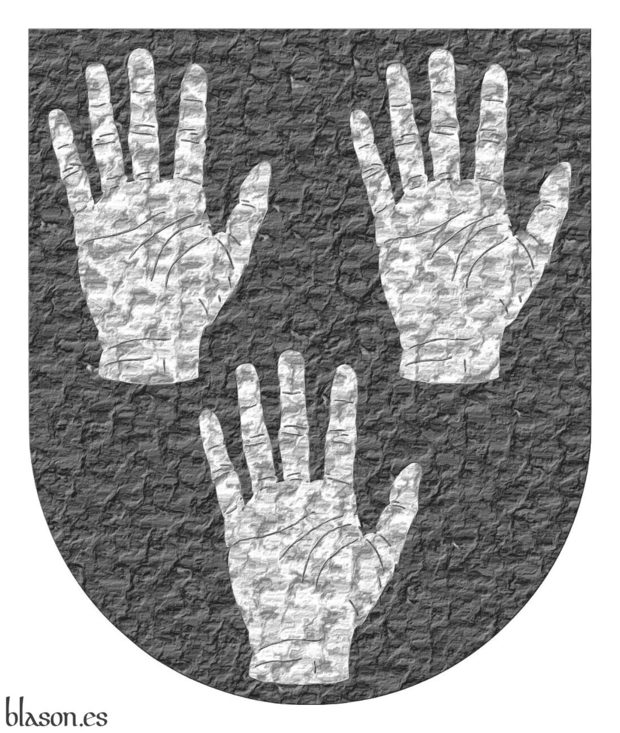
Sable, three dexter hands turned up, and appaumée Argent.
Escudo de sable, tres manos diestras levantadas y apalpadas de plata.
Coat of arms interpreted based on blazon and explanations of [Avilés, J.; 1725a; pages 34 y 35 y sheet 2 figure 38].
Blazon keywords: Without divisions, Sable, Three, Hand, Dexter, Argent, Turned up, Appaumée and Ordered.
Style keywords: Semi-circular, Plain tincture, Outlined in the field tincture and Soft metal.
Classification: Interpreted, Personal and Kingdom of France.
Bearer: Baudry en Francia.


Bourgeois, lineage of Burgundy
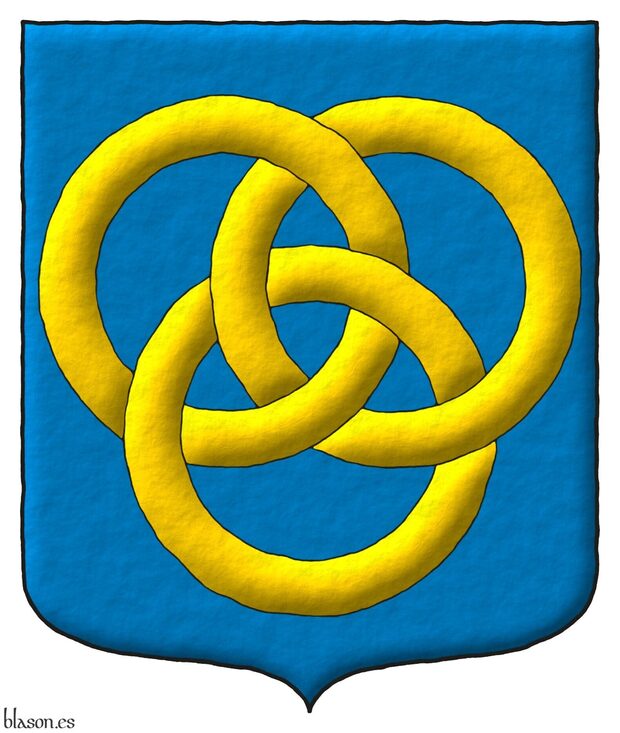
Azure, three annulets interlaced Or.
Illuminated, with a watercolor finishing and with a pointed shape.
You can found it at [Avilés, J.; 1725a; page 76 and illustration 177]], and at [Avilés, J.; 1780a; page 85 and illustration 177]].
Blazon keywords: Without divisions, Azure, Three, Annulet, Interlaced and Or.
Style keywords: Watercolor, Outlined in sable, Illuminated and Pointed.
Classification: Interpreted, Lineage, Kingdom of France and Coat of arms.


Bourgeois, lineage of Burgundy, France

Azure, three annulets interlaced Or.
Escudo de azur, tres anilletes entrelazados de oro.
Coat of arms emblazoned by me with plain color Azure and metal Or and with a shape ended with an ogee arch.
Blazon keywords: Without divisions, Azure, Three, Annulet, Interlaced and Or.
Style keywords: Watercolor, Outlined in sable, Illuminated and Ogee.
Classification: Interpreted, Lineage, Kingdom of France and Coat of arms.


Cerda, Carlos de la
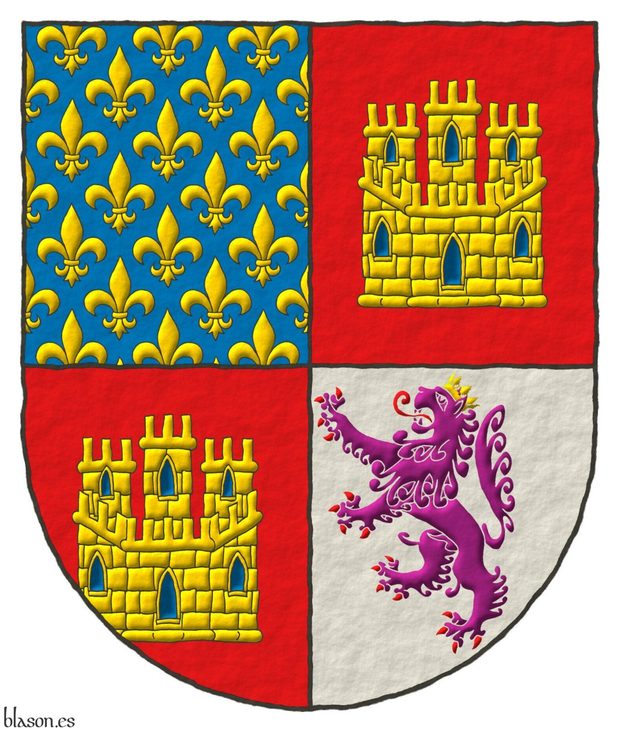
Known in England and France as Charles of Spain ~ Charles d'Espagne.
Quarterly: 1 Azure semé of fleurs de lis Or; 2 and 3 Gules, a castle triple towered Or, the port and windows Azure, masoned Sable; 4 Argent, a lion rampant Purpure, armed and langued Gules, crowned Or.
Coat of arms of Charles de la Cerda (1326-1354), this coat of arms also could be blazoned as «Quarterly: 1, Francia; 2 and 3, Castile; 4, Leon.».
Blazon keywords: Quarterly, Azure, Semé, Fleur de lis, Or, Gules, Castle, Port and windows, Masoned, Sable, Argent, Lion, Purpure, Rampant, Armed, Langued, Crown and Crowned.
Style keywords: Semi-circular, Illuminated, Outlined in sable and Freehand.
Classification: Interpreted, Personal, Army and Navy and Kingdom of France.
Bearer: Cerda, Carlos de la.


Charles V of France
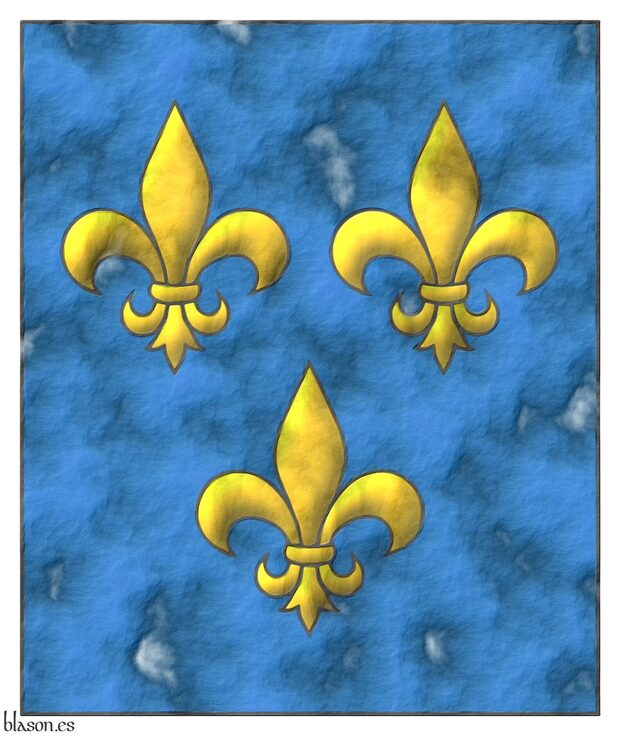
Banner Azure, three fleurs de lis Or.
Pendón de azur, tres flores de lis de oro.
Banner interpreted as follows: rectangular in shape with a 5x6 proportion; the field enamelled in flat Azure; the three fleurs-de-lis illuminated in Or and outlined in Sable; and the whole piece finished with an aged parchment effect.
Starting in 1376, the field sown with fleurs-de-lis was replaced by only three fleurs-de-lis. This change took place during the reign of Charles V of France (1338–1380, King of France from 1364 to 1380).
Edward III Plantagenet (1312–1377, King of England from 1327 to 1377) had incorporated the semé of fleurs-de-lis into his arms as a sign of his claim to the French throne, and Henry IV of England (1367–1413, King of England from 1399 to 1413) again changed the semé into three fleurs-de-lis in his own arms.
These three fleurs-de-lis remained in the royal arms of England until George II (1683–1760, King from 1727 to 1760).
They remained in the royal arms of the French kings until their prohibition during the so-called «Hundred Days», that is, from March 20, 1815, the date of Napoleon’s return to Paris from his exile in Elba, until June 28, 1815, the date of the Second Restoration of Louis XVIII as King of France, when they were reinstated. Finally, after the Revolution of 1830, Louis Philippe I of Orléans decreed their abolition by Order of February 10, 1831.
This banner is a recreation of the one appearing in the armorial [Edward IV of England; 1461; row 23, column 2], although in that armorial the banner seems to be associated with Louis IX of France, perhaps because of the prestige of the saintly King of France, whose arms bore a semé of fleurs-de-lis rather than three.
Blazon keywords: Without divisions, Azure, Or, Three, Fleur de lis and Ordered.
Style keywords: Rectangular, Illuminated, Outlined in sable and Old parchment.
Classification: Interpreted, Personal, Flag, Banner of arms, Kingdom of France and House of Valois.
Bearer: Charles V of France.


Charles VII of France
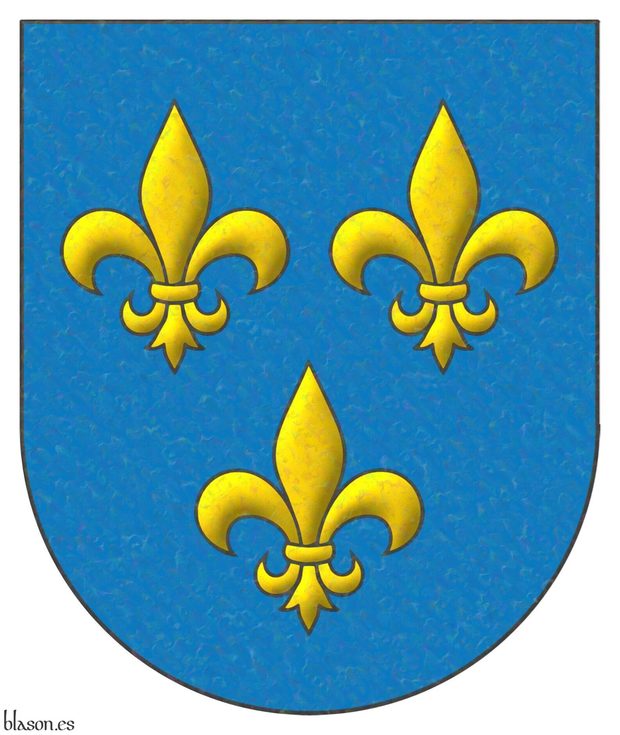
King of France from 1429 to 1461.
Azure, three fleurs de lis Or.
Escudo de azur, tres flores de lis de oro.
Coat of arms interpreted with: a semicircular (round) base; the field enamelled in flat Azure; the fleurs-de-lis illuminated in Or and outlined in Sable; and finished with a mother-of-pearl effect.
This coat of arms is based on the one appearing in the armorial [Ingeram, H.; 1459; page 34, 1st shield], under the inscription «küng von franckrich» (franckrich ~ Frankreich ~ France).
Blazon keywords: Without divisions, Azure, Or, Three, Fleur de lis and Ordered.
Style keywords: Semi-circular, Illuminated, Outlined in sable and Iridescent.
Classification: Interpreted, Personal, Coat of arms, Kingdom of France and House of Valois.
Bearer: Charles VII of France.


City of Haguenau, Alsace
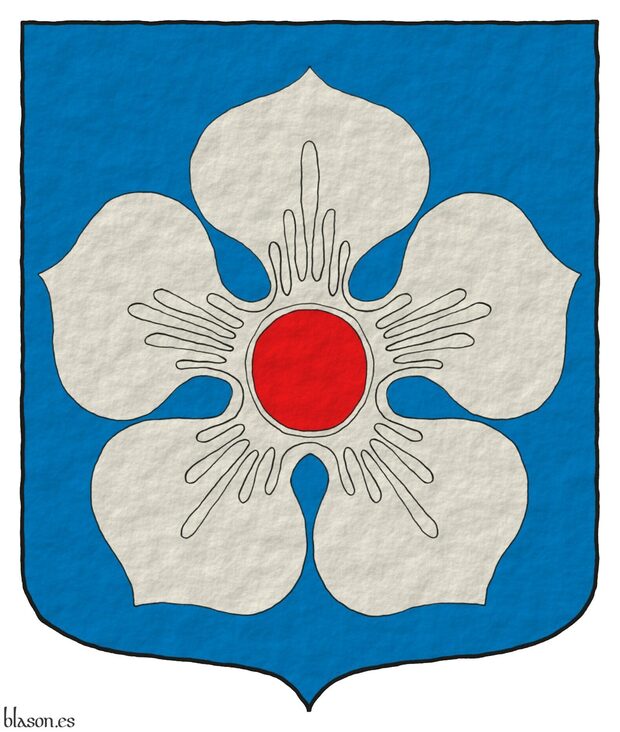
Azure, a cinquefoil Argent, seeded Gules.
Escudo de azur, un quinquefolio de plata, botonado de gules.
Coat of arms emblazoned by me with plain color Azure and metal Or and with a shape ended with an ogee arch.
Blazon keywords: Without divisions, Azure, One, Cinquefoil, Argent, Seeded and Gules.
Style keywords: Outlined in sable, Illuminated and Ogee.
Classification: Interpreted, Lineage, Kingdom of France, Civic and Coat of arms.
Bearer: Haguenau.


Clermont, Robert of
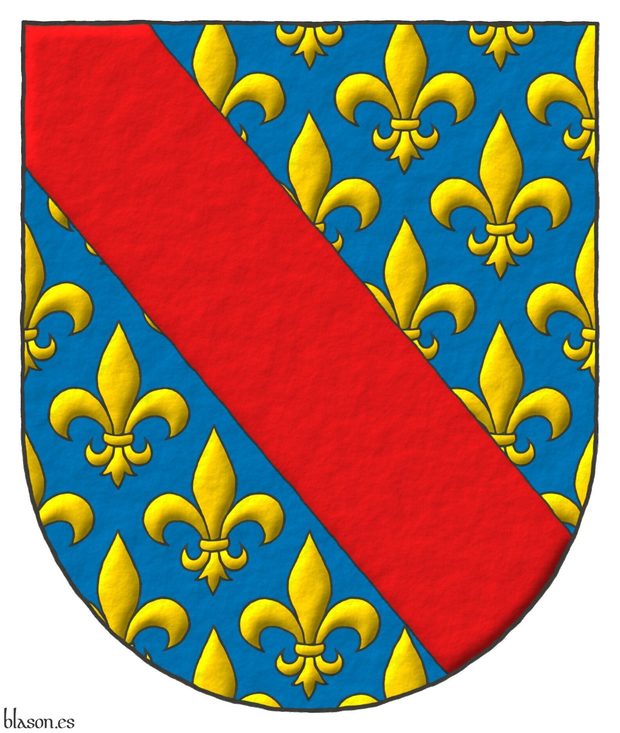
Grandson of Blanche of Castile, 6th son of Saint Louis IX, founder of the House of Bourbon, husband of Beatrice of Burgundy, Lady of Bourbon.
Azure semé of fleurs de lis Or, a bend Gules.
Escudo de Azur sembrado de flores de lis de oro, banda gules.
Coat of arms that I have interpreted with:: a semicircular (round) base; the field enamelled in flat Azure; the fleurs-de-lys illuminated in Or; the bend illuminated in Gules; the whole is outlined in Sable; and the freehand drawing.
Blazon keywords: Without divisions, Azure, Or, Semé, Fleur de lis, Bend and Gules.
Style keywords: Semi-circular, Illuminated, Outlined in sable and Freehand.
Classification: Interpreted, Personal, Coat of arms, Kingdom of France and House of Bourbon.
Bearer: Clermont, Robert of.


First schema for the arms of Gilbert des Essarts
Gules, a chevron Or.
Arms of Gilbert des Essarts, France, emblazoned by me. This scheme (outlined and then in plain tincture) depicts a chevron with a wider, more obtuse angle than usual. This design shows that the chevron is constructed with the side lines forming an angle where the tangent of half the angle is 56.3o, arctan(3/2), its width is made one-fourth of the shield's overall width, and the position of the chevron's lower point (the apex) is governed by the shield's geometric center, resulting in a visually more open shape than the standard.
Blazon keywords: Gules, Or, One and Chevron.
Style keywords: Ratio, Outlined in sable, Plain tincture and Pointed.
Classification: Personal, Kingdom of France, Interpreted, Schema, Boa and Coat of arms.
Bearer: Gilbert des Essarts.


Francis I of France
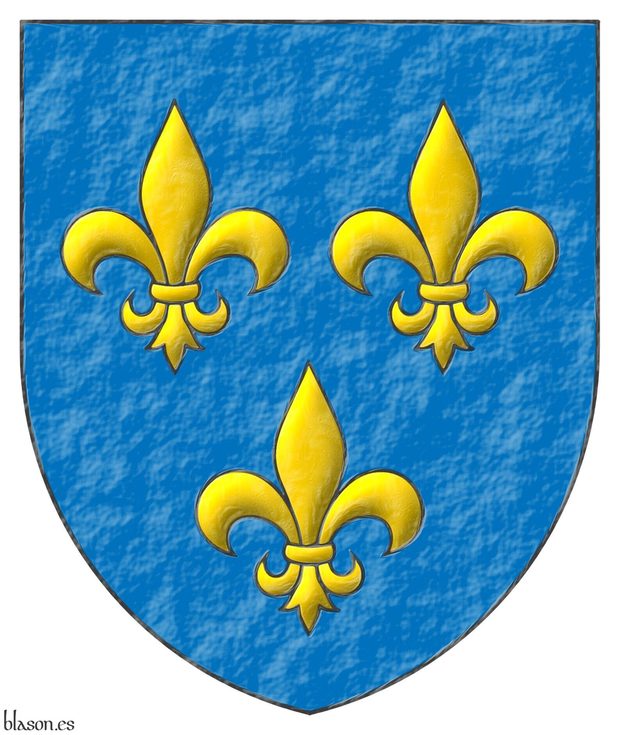
From the House of Valois-Angoulême and with the motto: Nutrisco et extinguo.
Azure, three fleurs de lis Or.
Escudo de azur, tres flores de lis de oro.
Coat of arms interpreted with: a pointed base; the field enamelled in flat Azure; the three fleurs-de-lis outlined in Sable and illuminated in Or; and finished with a plaster texture.
Blazon keywords: Without divisions, Azure, Or, Three, Fleur de lis and Ordered.
Style keywords: Pointed, Illuminated, Outlined in sable and Gesso.
Classification: Interpreted, Personal, Coat of arms, Kingdom of France and House of Valois.
Bearer: Francis I of France.


![Ver [Lainé, P. L.; Lainé, J. J. L.; 1828] en referencias bibliográficas. Libro abierto, hojas de plata, filo de oro, guardas de gules, tapas de sable.](../css/Libro.Bibliografia.png)
Lainé, P. L.; Lainé, J. J. L.; 1828
P. Louis Lainé, J. J. L. Lainé, «Archives généalogiques et historiques de la noblesse de France, ou, Recueil de preuves, mémoires et notices généralogiques, servant à constater l'origine, la filiation, les alliances et lés illustrations religieuses, civiles et militaires de diverses maisons et familles nobles du royaume; Avec la collection des nobiliaires généraux des provinces de France», 11 volumes from 1828 to 1850, published by M. Lainé, printed by De Hauquelin et Dautriche, París, 1844.
Bibliographical reference of century XIX.
Classification: French language and In black and white.
The 2 authors are Lainé, P. Louis and Lainé, J. J. L..
External links:
- Google books, Volume I, 1828.
- Google books, Volume II, 1829.
- Google books, Volume III, 1830.
- Google books, Volume IV, 1834.
- Google books, Volume V, 1836.
- Google books, Volume VI, 1839.
- Google books, Volume VII, 1841.
- Google books, Volume VIII, 1843.
- Google books, Volume IX, 1844.
- Google books, Volume X, 1846.
- Google books, Volume XI, 1850.


Larre, lineage of Bayonne, French Basque Country
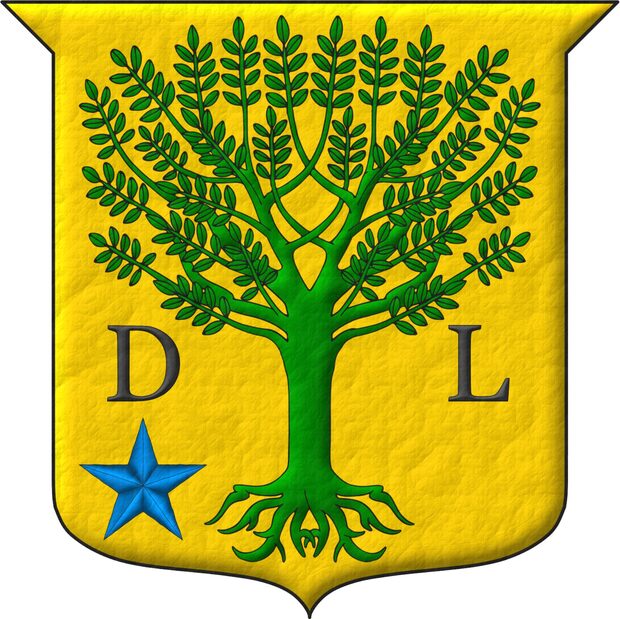
D'or à un arbre arraché de sinople, accosté à dextre de la lettre capitale «D» et à senestre de la lettre capitale «L» du même, et une étoile d'azur posée au canton dextre de la pointe.
Or, a tree eradicated Vert between a capital letter «D» and a capital letter «L» Sable, in the dexter of the base a mullet Azure.
Illuminated with lights and shadows and with a leather finish.
Blazon keywords: Without divisions, Or, One, Tree, Erased, Vert, Between, Letter, Sable, Canton, Dexter, Base (lower 1/3), Mullet, Five and Azure.
Style keywords: Leather, Outlined in sable, Illuminated and Semi-circular.
Classification: Interpreted, Lineage and Kingdom of France.


Leonor de Aquitania y Enrique de Inglaterra
[ Gules, a lion rampant Or, ] accolé with [ Gules, a lion passant, guardant Or ].
[ Escudo de gules, un león rampante de oro, ] acolado de un [ escudo de gules, un leopardo de oro].
Existing arms interpreted by me as follows: both coat of arms are rotated ±30o; their shapes are pointed; the field of each coat of arms has been enamelled in flat Gules; the lion and the leopard in Or are outlined in Sable; and the whole composition of both arms has a rough texture finish.
Examples of accolated coat of arms (written as «accolé» in the 18th century) can be seen in [Avilés, J.; 1780a; pages 24 and 25 and plate 1: figures 1 and 2].
Blazon keywords: Without divisions, Gules, One, Lion, Or, Rampant and Leopard.
Style keywords: Pointed, Plain tincture, Outlined in sable, Tilted shield and Metal beaten.
Classification: Interpreted, Personal, Accolé arms, Duchy of Aquitaine, Kingdom of France and Kingdom of England.
Bearer: Leonor de Aquitania.


Louis IX of France
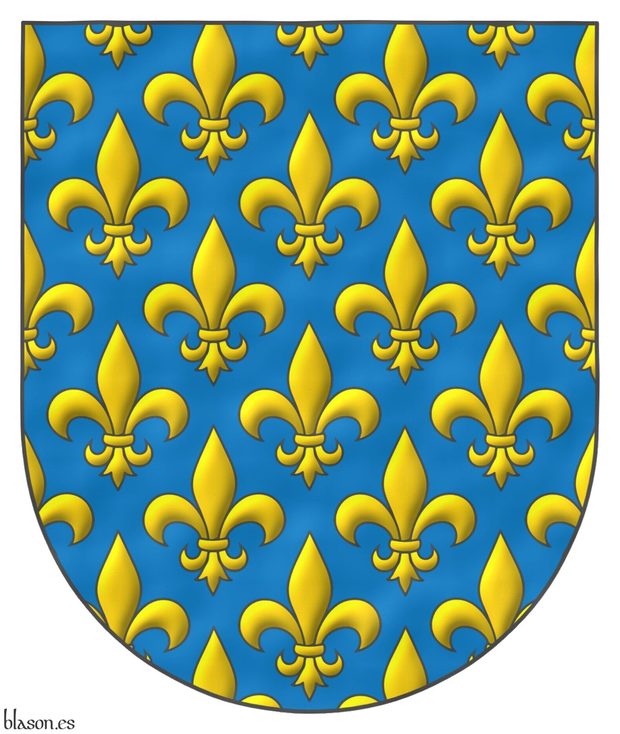
Saint Louis, King of France (1214-1270), son of Blanche of Castile.
Azure semé of fleurs de lis Or.
Escudo de Azur sembrado de flores de lis de oro.
Coat of arms interpreted by me as follows: the shield has a semicircular (round) base; the field is enamelled in flat Azure; the fleurs-de-lis are outlined in Sable and illuminated in Or; and finished with a watercolor effect.
Toward the end of his reign, the armorial called [Wijnbergen; 1265] was created, whose first part is devoted to recording his coat of arms [Wijnbergen; 1265; shield no. 1], which was also that of his father Louis VIII, husband of Blanche of Castile, and the coats of arms of those who were his vassals.
Blazon keywords: Without divisions, Azure, Or, Semé and Fleur de lis.
Style keywords: Semi-circular, Illuminated, Outlined in sable and Watercolor.
Classification: Interpreted, Personal, Coat of arms, Kingdom of France and House of the Capetians.
Bearer: Louis IX of France.


Malvin de Montazet, lineage of Languedoc
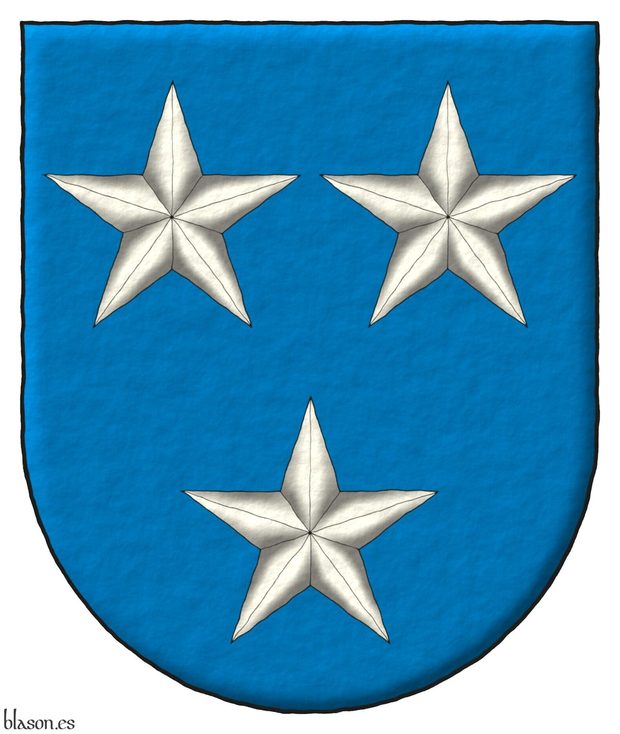
Blazon of the Malvin de Montazet lineage of Languedoc, France.
Azure, three mullets Argent, 2 and 1.
Illuminated and a freehand finishing.
Its French blazon «d'azur, à trois étoiles d'argent, 2 et 1» can be found at [Rietstap, J. B.; 1861; page 140].
Blazon keywords: Without divisions, Azure, Three, Mullet, Argent and Ordered.
Style keywords: Freehand, Outlined in sable, Illuminated and Semi-circular.
Classification: Interpreted, Lineage and Kingdom of France.


Philip III of France
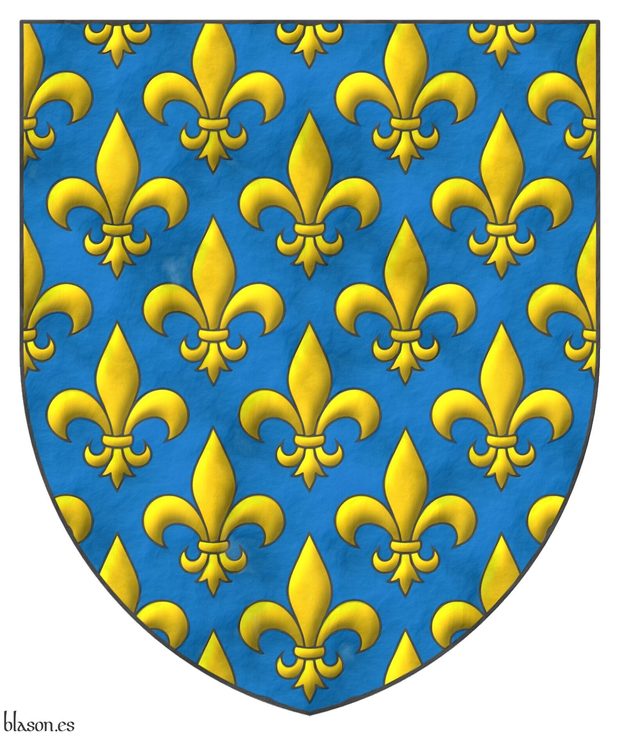
King of France from 1270 to 1285, grandson of Blanche of Castile.
Azure semé of fleurs de lis Or.
Escudo de Azur sembrado de flores de lis de oro.
Coat of arms interpreted with: a pointed base; the field enamelled in flat Azure; the fleurs-de-lis illuminated in Or and outlined in Sable; and finished with a parchment effect.
During his reign, it is believed that the second part of the armorial [Wijnbergen; 1265] was completed, which ends with the coats of arms of several kings, many of them European, beginning this series with the coat of arms of the King of France himself, [Wijnbergen; 1265; shield no. 1,288], which has served as the inspiration for the one recreated here.
Blazon keywords: Without divisions, Azure, Or, Semé and Fleur de lis.
Style keywords: Pointed, Illuminated, Outlined in sable and Parchment.
Classification: Interpreted, Personal, Coat of arms, Kingdom of France and House of the Capetians.
Bearer: Philip III of France.


![Ver [Wijnbergen; 1265] en referencias bibliográficas. Libro abierto, hojas de plata, filo de oro, guardas de gules, tapas de sable.](../css/Libro.Bibliografia.png)
Wijnbergen; 1265

Wijnbergen, unknown authors, «Wijnbergen Armorial», currently located in The Hague and owned by the Royal Dutch Society of Genealogy and Heraldry, Île-de-France, 1265.
This armorial is called «Wijnbergen» because it was named after one of its early owners, and the names of its authors are unknown. I have retained this name in the key to this bibliographic reference for easier identification.
Among known manuscripts, it is the oldest armorial of French heraldry.
It is composed of 15 parts, although some authors divide it into 23, belonging to 2 different temporal stages of creation: a 1st stage from 1265 to 1270 and a 2nd stage, more difficult to date, from 1270 to 1285.
The armorial is written in French and contains a total of 1,312 coats of arms, of which 256 belong to the 1st stage and 1,056 to the 2nd stage.
Those of the 1st stage belong to the vassals of the Île-de-France under the reign of Luis IX de Francia, Saint Louis King of France.
Those of the 2nd stage, probably already under the reign of Felipe III de Francia, contain coats of arms from Normandy, Anjou and Poitou, Lorraine, Germany, Artois, Champagne, Vermandois, Brittany, Beauvais, Burgundy, Brabant, Hainaut (Belgium), Flanders, and finally, the coats of arms of 25 kings, mainly European.
Bibliographical reference of century XIII.
The author is Wijnbergen, Anonymous.
The following articles cite this bibliographic reference:
External resources:
-
Language
-
Categories of heraldry
-
Divisions of the field
- Without divisions
- Party per pale
- Party per fess
- Party per bend
- Party per bend sinister
- Tierce
- Tierce sinister
- Tierced per pale
- Tierced per fess
- Tierced per bend
- Tierced pallwise inverted
- Quarterly
- Quarterly per saltire
- Gyronny
- Party per fess, the chief per pale
- Party per pale, the sinister per fess
- Party per fess, the base per pale
- Party per pale, the dexter per fess
- Chapé
- Chaussé
- Embrassé
- Contre-embrassé
- Party per chevron
- Enté
- Enté en point
- Flanched
-
Metals
-
Colours
-
Furs
-
Other tinctures
-
Ordinaries and sub-ordinaries
-
Diminutives of the ordinaries
-
Geometric charges
-
Composite ordinaries
-
Inanimate charges from Nature
Atom, Crescent, Diamond, Emerald, Estoile, Increscent, Lightning flash, Moon, Mount, Mullet, Mullet of four points, Orbital, Plough of Ursa Major, Rainbow, Ray of the sun, River, Sea, Snowflake, Sun, Sun in splendour, Sun of May, Trimount, Water and Wave.
-
Vegetal charges from Nature
Acorn, Apple, Apple tree, Ash, Bluebonnet, Camellia, Chrysanthemum, Cinquefoil, Cornflower, Dogwood flower, Double rose, Eguzki-lore, Elm, Fleur de lis, Flower, Gourd, Holm oak, Hop cone, Indian paintbrush, Kapok tree, Laurel, Lily, Linden, Lotus flower, Madonna lily, Mexican cedar tree, Oak, Olive tree, Palm tree, Plantain plant, Pomegranate, Poplar leaf, Rose, Shamrock, Sunflower, Thistle, Tree, Tulip, Vine and Wheat.
-
Animal charges from Nature
Badger, Bald eagle, Barbel, Barn owl, Bear, Beaver, Bee, Beetle, Bighorn sheep, Binson, Blackbird, Boar, Brach hound, Bull, Cow, Doe, Dog, Dolphin, Dove, Eagle, Elephant, Falcon, Female figure, Fish, Flame, Fly, Fox, Frog, Goat, Goldfinch, Goose, Heron, Horse, Hummingbird, Jaguar, Lark, Leopard, Lion, Lion passant, Lion rampant guardant, Lioness, Lynx, Male figure, Martlet, Merino ram, Owl, Panther, Parrot, Peacock, Pelican, Pelican in her piety, Pronghorn, Puffin, Quetzal, Raven, Roe deer, Rooster, Savage, Seagull, Serpent, She-wolf, Stag, Starling, Talbot, Turtle, Tyger, Vulture, Warren hound and Wolf.
-
Parts of natural charges
Arm, Beak, Branch, Caboshed, Chest, Claw, Covert, Dorsal fin, Eagle claw, Ear of wheat, Ermine spot, Escallop, Feather, Foot (palmiped), Foreleg, Forepaw, Hand, Head, Heart, Hoof, Leaf, Neck, Ostrich feather, Palm frond, Paw, Roe deers' attires, Shoulder, Sprig, Stags' attires, Stem, Swallow-tail, Tail, Tail addorsed, Tail fin, Talon, Tibia, Tooth, Trunk, Trunk (elephant), Two hands clasped, Two wings in vol, Udder, Wing and Wrist.
-
Artificial charges
Ace of spades, Anchor, Anvil, Arch, Arm vambraced, Armillary sphere, Arrow, Axe, Bell, Bell tower, Beret, Bonfire, Book, Bookmark, Bow, Branding iron, Bridge, Broken, Buckle, Cannon, Cannon dismounted, Cannon port, Canopy roof, Carbuncle, Castle, Celtic Trinity knot, Chain, Chess rooks, Church, Clarion, Clay pot, Closed book, Club, Column, Comb, Compass rose, Conductor's baton, Cord, Covered cup, Crozier, Crucible, Cuffed, Cup, Cyclamor, Dagger, Displayed scroll, Double vajra, Drum, Ecclesiastical cap, Fanon, Federschwert, Fleam, Four crescents joined millsailwise, Galician granary, Garb, Gauntlet, Geometric solid, Grenade, Halberd, Hammer, Harp, Host, Hourglass, Key, Key ward, Knight, Knot, Lantern, Letter, Line, Loincloth, Maunch, Menorah, Millrind, Millstone, Millwheel, Monstrance, Mortar, Mullet of six points pierced, Nail, Non-classic artifact, Norman ship, Number, Oar, Oil lamp, Open book, Page, Pair of pliers, Pair of scales, Parchment, Pestle, Piano, Pilgrim's staff, Plough share, Polish winged hussar, Port, Portcullis, Potent, Quill, Ribbon, Rosette of acanthus leaves, Sabre, Sackbut, Sail, Scroll, Scythe, Sheaf of tobacco, Ship, Skirt, Spear, Spear's head, Stairway, Star of David, Step, Sword, Symbol, Tetrahedron, Torch, Tower, Trident, Trumpet, Turret, Two-handed sword, Wagon-wheel, Water-bouget, Wheel, Winnowing fan and With a turret.
-
Immaterial charges
Angel, Archangel, Basilisk, Dragon, Dragon's head, Garuda, Golden fleece, Griffin, Heart enflamed, Justice, Mermaid, Our Lady of Mercy, Ouroboros, Paschal lamb, Pegasus, Phoenix, Sacred Heart of Jesus, Saint George, Sea-griffin, Sea-lion, Trinity, Triton, Unicorn, Winged hand and Wyvern.
-
External elements
-
Heraldic creations
-
References
-
Formats
-
Keywords on this page
Port and windows, Between, Watercolor, Annulet, Appaumée, Parchment, Old parchment, Pointed, Armed, Erased, Azure, Bailleul, commune of, Bend, Flag, Baudry en Francia, Bibliography, Boa, Seeded, Chevron, Canton, House of Valois, House of the Capetians, Ogee, Outlined in sable, Dexter, Interlaced, Coat of arms, Mullet, Fleur de lis, Personal, Gules, Illuminated, Interpreted, Lion, Lineage, Semi-circular, Ordered, Or, Argent, Without divisions, Civic, Rampant, Kingdom of France, Sable, Semé, Plain tincture, Freehand, Three and One.

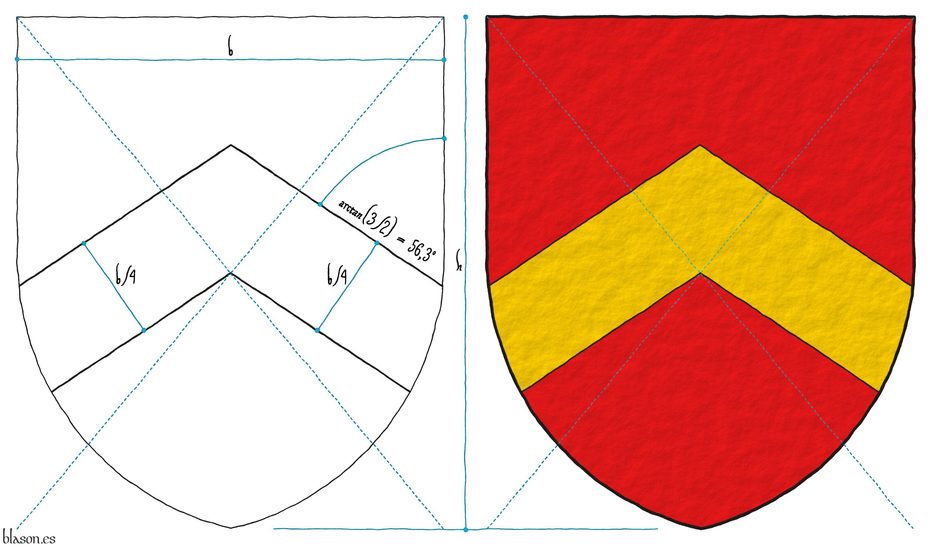
![Leonor de Aquitania y Enrique de Inglaterra [ Gules, a lion rampant Or, ] accolé with [ Gules, a lion passant, guardant Or ].](../escudo_armas/LeonorA.22.EnriqueII.jpg)